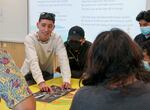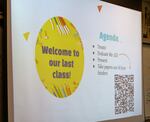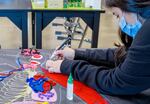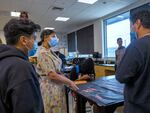Earlier this spring, students in Darshanpreet Gill’s human body systems class sat outside as they filled out booklets about the respiratory system.
The dozen or so students spread out across a McDaniel High School courtyard. One group gathered at a table, a few others were on a concrete bench, and others on the grass. One student played music from their phone as Gill walked around offering help to students with medical jargon – and English.
“You know what to write next, you know this, you understood this,” Gill said, offering encouragement to an 11th grader named Thang. “Thang, do you know how to spell with? W-i-t-h. With breathing, because the muscles around the bronchioles…”

McDaniel High School teacher Darshanpreet Gill observes her students during class June 9, 2022. Gill teaches two sections of science for students new to the United States whose education has been impacted.
Elizabeth Miller / OPB
Gill teaches science at the Northeast Portland high school, and two of the four classes she teaches are specifically for newcomers, like Thang, who’ve been identified by the district as living in the United States for less than two years. Her students are classified as having severely interrupted formal education with varying levels of literacy both in English and their home language or languages.
“They may have literacy, they may just have been out of school for a long time, so they don’t know how school works,” Gill said. “I’ve had kids where we had to coach them on how to use scissors, so that’s really impacted education or literacy in your own language.”
In addition to getting Gill’s support, students in the courtyard helped each other, as they write sentences in English or color diagrams in the booklet.
Thang speaks Vietnamese. Sitting at a table with classmates who speak Spanish, they chat in English and sometimes, in Spanish.
“This class is the best class,” said sophomore Danhia. “Because it’s really fun, and we learn a lot.”
Danhia sits next to Fatima and Norma, two other sophomores.
“I feel so much better in a classroom with people who don’t speak too much English than in a classroom with people who only speak English because I know that they understand me,” Danhia said, gesturing to her classmates.

Senior Cristo presents his illustration of the human body to science teacher Darshanpreet Gill at McDaniel High School. Cristo is new to the US, having arrived to Portland from Mexico in December.
Elizabeth Miller / OPB
Teenagers new to the U.S. are not only learning high school academics like biology but a new culture and they often need the most intensive language support. Officials at Portland Public Schools say a new staffing formula based on English proficiency will help prioritize support for these newcomers, with less extra support for other English learners. Teachers agree the newcomers need lots of help, but they worry that students who’ve been learning English longer may start to struggle, leaving teachers who work with those students to do more with less. And that, teachers fear, could undermine morale and invite educator burnout.
Layered on top of the distinction between newcomers and students who’ve been in the U.S. longer, is a variation among PPS high schools.
Last year, Danhia was learning online for most of the year, like most other Portland students. But she, Fatima, and Norma were all learning English as part of the Portland International Scholars Academy, or PISA.
PISA high schools — McDaniel and Roosevelt in North Portland — are like schools-within-a-school, with separate administrators and support staff.
What PISA schools and Portland’s other high schools have in common is they all use “sheltered instruction” for English learners, which provides English support as students build academic skills and content knowledge. Sheltered teaching often means adding visual materials, being more interactive, or spending extra time on a course’s terminology. In some Portland schools, English may be the only sheltered class.
At the PISA program at McDaniel, every core class is “sheltered.”
The classrooms reflect all of the varying places and situations students have come from, with students enrolling throughout the year at varying levels of English comprehension and educational progress. Many of the teens here endured trauma before arriving at a Portland high school.

Darshanpreet Gill’s last class includes presenting final projects and an evaluation. Gill teaches students new to the US who are learning English. This year, she translated her teacher evaluation form for her students to fill out.
Elizabeth Miller / OPB
Students’ measures of success vary too, Gill said.
“Sometimes it’s just getting them comfortable, and that’s the growth, getting them used to the process of schools, and bells and bathroom passes and going to classes and all that,” Gill said. " … For most of them, obviously, it’s going to be growing your language ability in English, for some it’s going to be language and science content.”
But Gill’s class, while ideal for new students learning English, is not the norm across the district.
Fewer sheltered classes leave teachers fighting for resources
If a student who needs help learning English enrolls at McDaniel or Roosevelt, they will likely be a part of PISA. Those programs are slated to get more support under the district’s new funding formula.
But not every Portland newcomer ends up in PISA. And those students won’t reap the same benefits from recent formula changes as their counterparts enrolled at PISA.
At Jefferson High School in North Portland, teacher Jaclyn Bovee asked her beginning English language learner class what their favorite — or least favorite — class has been this year. It’s the last day before finals.
“We do a warm-up question, a question of the day every day at the beginning of class just to help practice our oral language and get them speaking and listening in English,” Bovee explained.
As one student keeps track of the class’s answers by writing them on the board, there’s an overwhelming winner — Bovee’s beginner-level English language development class is the runaway favorite.
“Ms. Bovee is incredible,” said 11th grader Gabriela, a student in the class.
“For many students, this is their favorite class,” Bovee said. “You know, it’s their friends, it’s their community, it’s where I think many of them feel most at home.”
Bovee notices a trend among students’ other favorite classes: they all have some kind of “sheltered” component, with teachers who try to make class more accessible for English learner students.
“It’s the classes where they’re getting the most support,” she said, adding that she sees better attendance for beginners in sheltered classes.
Jefferson only offers one sheltered class: English. Bovee said after constant pressure from teachers, next year Jefferson will add a sheltered social studies course.
“We’re always fighting for more and trying to increase the programming,” she said.
District officials said leaders at the school level determine whether to add classes for newcomer students or other English Learners, based on the size of their teaching staff and the needs and number of their students.

A student puts finishing touches on her final project for Darshanpreet Gill’s class at McDaniel High School, a colorful, detailed illustration of the human body.
Elizabeth Miller / OPB
Schools serving at least 50 bilingual students can also receive a part-time, bilingual educational assistant.
But filling open positions at schools has been a national challenge. While Jefferson had enough students to add an assistant this past year, Bovee said she was unable to hire anyone because the job was part-time and low-paying.
Bovee is accustomed to having to advocate for resources over her six years at Jefferson. She’s now a full-time English language development teacher and case manager, but in the beginning, she had to split her time between English learners and other students. She took leave from her mainstream students to better support the English learners.
“I could not do both, I felt like I was constantly pulled between different departments, and I saw the need to focus on English language learners, but I also needed to support all my other students,” Bovee said.
Bovee said her students need more sheltered classes and more one-on-one instruction. The recently-approved Portland Public Schools’ budget provides an increase of 10 full-time ELD staff for next year. But those positions are all at elementary schools.
English language teachers decry formula change, calling it ‘disgraceful’ and ‘racist’
This past school year, the PISA program moved from one high school — Benson Polytechnic High School — to two, hosting students at McDaniel and Roosevelt High School in North Portland.
District officials say the program has blossomed with the move. The two schools are able to serve about 90 students, more than double the number PISA served at Benson.
“When we started the process of transforming PISA into two schools, there were 18 students to nine adults,” said PPS Academic Program Administrator for 6-12 ELD Jennifer Anderson. “I’m very proud of how the program has grown and that more students are able to receive those services.”
About 35 newcomer students attend the district’s other high schools and programs.
Next year, a change in the district’s staffing formula means another big change for students learning English. Before, the staffing levels were based on the number of students and excluded some students in language immersion programs.
Next year, staffing levels will be based on students’ English language skills, as measured on a standardized test called the English Language Proficiency Assessment. Depending on proficiency in reading, writing, listening, and speaking English, some students would receive additional weighting, on top of base funding the district spends on every student, which ranges from about $7,000 to $16,000, depending on the school. The additional funding based on English proficiency could double funding for some students earlier in their English learning, but reduce the amount for more proficient students.
The change raised alarms for ELD teachers across the district, some of whom showed up to school board meetings during the spring budget season to speak out against it.
At one board meeting in March, Rosa Parks Elementary teacher Beyoung Yu wore a T-shirt that read “English Language learners are not half a percent,” referring to the variation in additional funding some students will receive. Yu called the policy “racist.”
“Keep the newcomers weighted as 1.5, and leave everyone else at 1 or more,” Yu asked.
At the May meeting where the board approved the budget, Roosevelt High School teacher Nadia Coronado tried to make a last-minute case to rethink the formula change.
“I am here with 16 years experience as a language specialist, with bilingual skills, with degrees in behavioral science, how the brain learns, and education,” Coronado shared at a May 24 meeting. “... I’m telling you with all my experience, I will be less successful with my students and their families with this new formula.”
Coronado called the new funding formula “disgraceful,” and warned that PPS’ graduation rate for this group of students will decline because of it.
The four-year graduation rate for English learners in 2020-2021 was 63.0%, more than 20 points below the district average of 84.4%. The five-year graduation rate was 72.9% for English Learners, again well below the 86.9% rate for all PPS students. Both four-year and five-year rates for English learners were among the lowest of student groups in Oregon’s largest district.
While graduation rates in Portland and statewide have steadily improved over the last decade, rates for English learners remain lower. The Oregon average for English learners was 64.4% for the Class of 2020-2021, a small dip from the previous year.

Teacher Darshanpreet Gill listens to students presenting on the last day of class June 9, 2022 at McDaniel High School.
Elizabeth Miller / OPB
Over the objections of some teachers, the Portland school board approved the budget and staffing formula changes last month.
“It’s differentiated supports because kids who are newcomers need more, and students who have higher levels of proficiency don’t need the same level of supports,” said Dana Nerenberg, who oversees PPS’ academic programs.
Teachers including Elicia Blackford, who teaches English Language Development at McDaniel, are happy to see newcomer students receive more funding, but they worry about declining support for other English learners who may not be new to the district, but still need help.
“Our newcomer population in the district is about 15% of our EL population, so if we shift all of those resources to 15%, then what’s happening to our 85%?” said Blackford.
Blackford is concerned about what support will be available for those newcomer students once they move up in their English proficiency.
“All of our newcomers will move up, and they will become higher proficiency levels, and they will still be needing supports,” Blackford said. “And we’re going to have this population, they’re just going to be moving into a void of support.”
But not all newcomers receive the same levels of support. If a newcomer student decides to stay at their neighborhood school instead of attending PISA, they will also see fewer resources.
At Jefferson, teacher Jaclyn Bovee said most of the students in her beginning English class would qualify for PISA, based on being new to the US, or having experienced school interruptions. They decide to stay at Jefferson because it’s close to home, or they have a relative at the school. But because they stay, they don’t receive as much support because they’re not assigned a part of the PISA program..
“They literally qualify for that program, they need sheltered classes, they need one-on-one instruction,” Bovee said.
Bovee said when she meets new families, she welcomes them to Jefferson. But she also lets them know their options.
“They often want to stay here, but if they’re told that their student is going to essentially receive less funded services, but have to take the bus across town when they’ve just arrived in town, that’s a really tough decision,” Bovee said.
Blackford sees a situation where students may not get as much “dedicated language instruction” once they’re out of the newcomer program. Long term, that could inhibit their learning English as quickly or fluently.
Shifting the narrative about English learners
Big picture, McDaniel teacher Elicia Blackford would like to see a major change in how schools think about English learners.
“Our language learners don’t have gaps, they come with so much knowledge,” Blackford said.
“As much as we’re pushing for these students needing more supports, it is not because they are coming here with a deficit. It’s because we have a deficit in how to fully utilize everything that they have and help them be successful here.”
Next year, Blackford would like to see the district work with teachers and families and seek their input when it comes to staffing and other matters.
Blackford, Bovee and Gill all mentioned the need for more training for all teachers, so they can support English language learners when they’re in mainstream classes.
But without more direct support and alternative ways to measure progress, Blackford sees students remaining categorized as English learners despite making steady progress in the language.
She’s seeing a lot of long-term English learners, students who have been in the program since kindergarten. She said those students’ needs were compounded by the pandemic, and as a result, those students are able to pass the proficiency test.
“It’s not because they still don’t know the vocabulary to be able to do it, it’s because they don’t have the academic skills for other reasons,” Blackford said, offering interrupted attendance as one of those reasons. “A lot of those students were not engaged online for so many reasons.”
There is evidence of the resilience of English learners in data the state collects, and reason for optimism. According to the Oregon Department of Education, “Former English Learners” — students who gain and demonstrate English proficiency and are able to exit English language development programs — graduate from high school at a higher rate than students who never needed that language support. The graduation rate for Former English Learners in the Class of 2021 was 84.2%, just above the statewide average of 80.6%.
Burnout, lack of research leads one teacher to seek solutions
But helping these students without the resources teachers say are needed takes a toll. After six years in the classroom, Jaclyn Bovee is leaving teaching.
“I love these kids, and I love the community, and I am really burnt out, and really, really tired,” Bovee said.
And though she won’t be teaching, she’ll still be in a classroom focusing on language. She’s entering a Ph.D. program at Oregon State University in language, equity, and education policy. She wants to create evidence-based research, so that districts like Portland can better serve students, and advocate for them.
“There are not enough studies, and some of the studies are old and some of them are done in elementary,” Bovee said, “and then used for policy in high school and it’s very, very different.”
But as Bovee prepares to leave a PPS classroom, one of her former students is in college, preparing to follow in her teacher’s footsteps.
Yuritvy Hernandez graduated from Jefferson High in 2019. When her sister arrived in Portland from El Salvador, she also went to Jefferson. Hernandez, now at Portland State University, wanted to help her sister feel more comfortable in high school, so she — helped with homework and translated for students.
Hernandez said she wants teachers to have patience with English Learner students, and for students to gain confidence and reassurance in their classrooms.
“A lot of them don’t think that they can do it,” Hernandez said. “But they can.”
Bovee is excited for her former student to become a teacher. But she worries about her.
“I don’t want Y[uritvy] to burn out too,” Bovee said in a text message to OPB. “We have to make this job more sustainable so that future educators like Y[uritvy] can not only survive, but love their job as much as they deserve to!”


